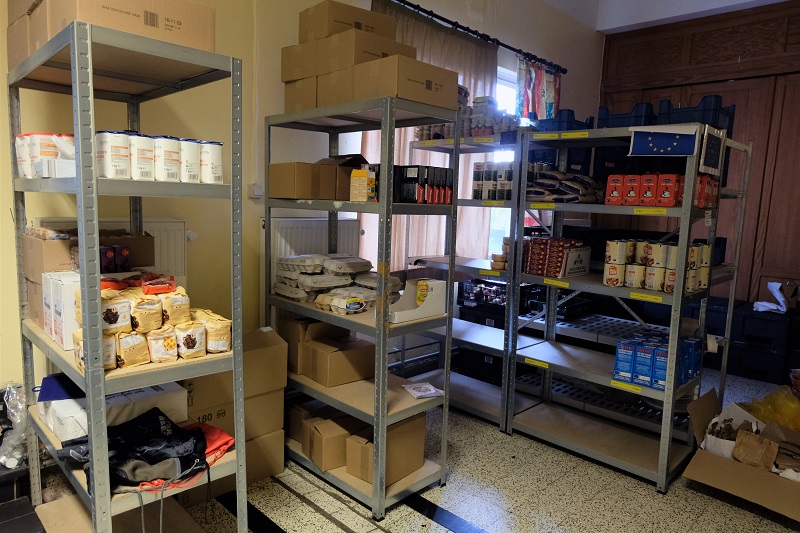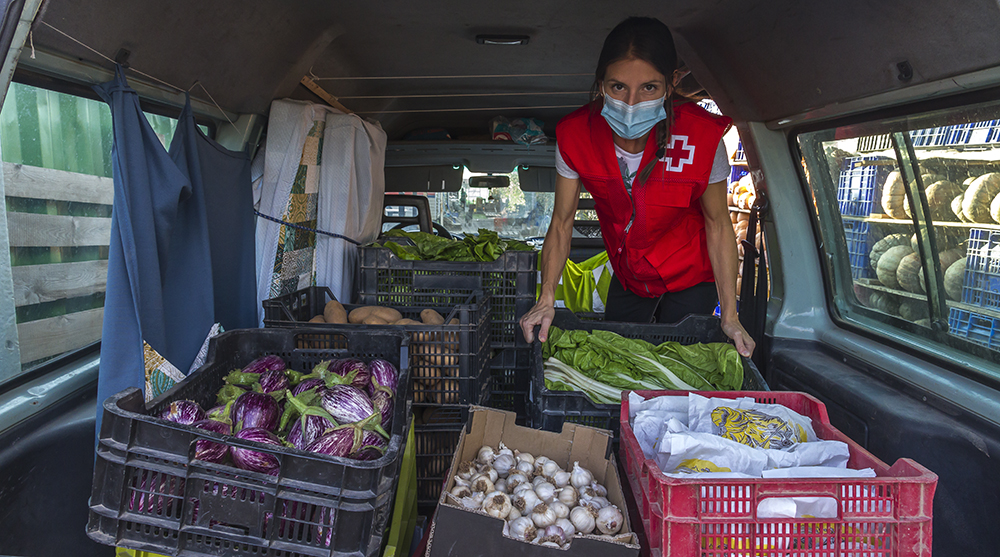For a European Social Fund Plus that fosters inclusion
The ESF+ provides support for EU employment, social, education and skills policies. At the beginning of the year, the European Commission launched a call for evidence to inform the mid-term of the 2021-2027 programming period to assess whether the Fund is working as intended - with a focus on programming and processes designed to support implementation.
National Red Cross Societies in the EU provide food aid and material support to a growing number of people in need due to the ongoing cost-of-living crisis. This includes families from migrant backgrounds with children, undocumented migrants, older people, people experiencing homelessness, and people living in isolated areas who need essential support, such as food and material assistance – many of whom were particularly severely impacted by the COVID-19 pandemic. Some of the food aid and material assistance that the Red Cross provides is with the support of EU funding, which during the period 2014-2020 was under the Fund for European Aid to the Most Deprived (FEAD), and currently since 2023, under the European Social Fund Plus (ESF+)[1] .
The transition from FEAD to ESF+ during a cost-of-living crisis scenario has posed challenges to many Red Cross societies. In some countries, the food aid and material support experienced a delay due to new administration procedures. This situation has intensified the pressure on social and health services across Europe, that were already suffering from the long-term impacts of the COVID-19 pandemic, as well as consequences of the Ukraine-Russia international armed conflict.

Similarly, the introduction of electronic vouchers in this context has been tricky. While the use of electronic vouchers can have a positive impact on people’s autonomy and independence, it has also diminished the role of non-for-profits. However, the number of people coming to the Red Cross asking for support experienced a peak, especially due to the Russia-Ukraine international armed conflict, forcing associations to find alternative sources of funding to be able to continue supporting people.
For the ESF+ 2021-2027 programme, the European Commission should strengthen the focus on the inclusion of people in situations of vulnerability; address long-term socio-economic challenges instead of crisis; increase co-funding rates for associations and non-for profits; enhance the visibility and recognition of non-for-profit organisations as the main actors implementing food aid and material support, and prevent unnecessary categorisation of communities at risk of exclusion.

- Strengthen the focus on inclusion of people experiencing vulnerability.
ESF+ has a large focus on employment and vocational training. We need to involve communities who are in need of basic aid, but also of vocational training and employment opportunities, to break the circle of poverty and provide them with real social inclusion schemes.
- Structural and Investment funds should not address crisis but long-term socio-economic challenges.
ESF+ is the EU’s main instrument to invest in people, to achieve high levels of social protection, to reinforce – not replace – social and health welfare systems, and to develop a skilled and resilient workforce. Since 2021, it is also the funding instrument to address poverty and social exclusion.
Combatting poverty requires societal changes and long-term investments based on people’s needs. Structural and Investment funds, such as ESF+, should not become tools to address crises. When needed, the EU and Members States should consider a separate emergency instrument, accessible to social services providers, at times of crisis and increased pressure on social protection systems.
- Increase co-funding rates for associations and non-for profits.
Under the current ESF+, co-funding rates are not enough. Many service providers are required to complement existing EU funding with own resources to effectively deliver support to communities. In a socio-economic context where there is an increase in the number of people in need, there is a growing risk of not being able to reach everybody.
- Enhance the visibility and recognition of non-for-profit organisations as the main actors implementing food aid & material support.
Non-for-profit actors have the recognition and the trust of the communities they serve, as they are often in the forefront of providing support during socio-economic crises. The involvement of non-for-profit organisations is fundamental to ensure the participation of social and case workers but also to voice the needs of people experiencing vulnerability.
- Prevent unnecessary categorisation of people at risk of exclusion.
Collecting data regarding vulnerable groups can provide valuable information on how to better reach the goals of the programme. However, it is fundamental to consider a wider set of questions regarding ethics, participation and inclusion to avoid marginalising people who are already at risk of exclusion.
In the next months, the European Commission will produce a final report taking all contributions to the ESF+ consultation into consideration. The consultation recommendations will also support discussions at the ESF+ Steering Group, composed of EU national and regional authorities, social partners, the European Commission, the European Parliament and some not-for-profit observers. Together with our members, we will continue monitoring the ESF+ implementation to ensure that it strengthens the focus on inclusion of people experiencing vulnerability and addresses long-term socio-economic challenges.
[1] To mitigate the impact of Covid19 pandemic and the impossibility of launching the new ESF+ on time, the Commission launched REACT-EU, which among other things, funded food aid and material assistance across Europe during the period 2020-2022.
For media inquiries, please contact Eva Oyón on: eva.oyon@redcross.eu or +32 2 235 09 22

